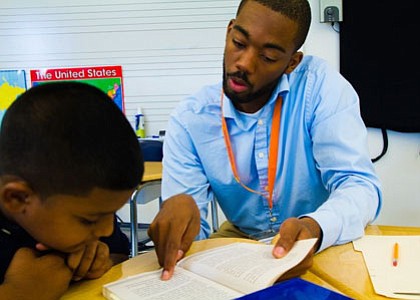Reading Partners, the nonprofit national early literacy organization that relies on the support of community volunteers to provide one-on-one tutoring to students in under-resourced elementary schools, has released its 2015-2016 impact reports which revealed that young Baltimore children are benefiting in a big way.
The program notes that in the Baltimore region 844 students at 14 Title I partner schools were matched with about 950 community volunteers who delivered in excess of 29,000 tutoring sessions over the course of the past year.
Among the Reading Partners’ youngest students in Baltimore, 86 percent mastered key foundational reading skills needed to read at grade level.
Based on survey responses found in the impact report, 92 percent of principals reported improved school-wide reading progress and 97 percent of teachers reported that Reading Partners is valuable to their school.
Further, the report revealed that 78 percent of K to 4 Reading Partner students met or exceeded their primary end-of-year literacy growth goal.
According to the National Assessment of Educational Progress, in 2015 only 21 percent of low-income students nationwide, and 36 percent of students overall, were reading proficiently by the fourth grade.
This means that nearly nine million low-income elementary school students are still learning to read when they should instead be reading to learn, officials said.
In Baltimore City, the situation is even worse, Reading Partners found.
Only 9 percent of low-income fourth-graders and 11 percent of fourth-graders overall were reading proficiently.
Baltimore’s struggling readers are falling well behind in literacy skill development compared to their national group of peers in the same grade, officials said. In the 2016-17 school year, Reading Partners aims to match 1,400 community volunteers with 1,150 struggling readers in the city.
By tutoring a student one-on-one for as little as an hour a week, volunteers can make an impact that can quite literally alter the course of a child’s educational experience and life, said Jeffrey Zwillenberg, the executive director of Reading Partners Baltimore.
“Our ability to be successful and grow so quickly in Baltimore is due to the incredible support we’ve received from our community. Reading Partners has a proven, effective model that works,” he said.
“Yet, if it wasn’t for our 1,000 committed weekly volunteers, and dedicated AmeriCorps members and staff ensuring our program was being implemented with fidelity, we wouldn’t be able to see the results we’ve seen,” Zwillenberg said.
“Our ability to scale so quickly is thanks to our many community partners, like Baltimore City Public Schools, the Maryland Governor’s Office of Service and Volunteerism, and the numerous foundations, corporations and individuals who have invested their dollars in our work,” he said.
Reading Partners collaborates with local public schools and mobilizes community volunteers to provide students the reading support they need to read at grade level by the fourth grade.
The nonprofit transforms a dedicated space into a Reading Center, complete with a library and teaching tools managed by a full-time AmeriCorps member or staff member.
Reading Partners collaborates with teachers and principals to identify students reading behind grade level, and provides them with personalized literacy instruction.
“Data drives our decisions, so we are constantly monitoring our student’s success and trying out innovative ideas,” Zwillenberg said.
“Whether it is partnering with other similarly-mission driven programs to implement tutoring during the summer months or introducing a new game to a lesson, we are constantly thinking about ways we can push our students to proficiency and foster a love of reading,” he said.
This school year, Reading Partners plans to help students in 19 Baltimore City schools.
“Baltimore is a proud city filled with generous community members,” Zwillenberg said. “We want to provide them with a means to give back to the city and support Baltimore City Public Schools.”
For more information, visit www.readingpartners.org/baltimore.
